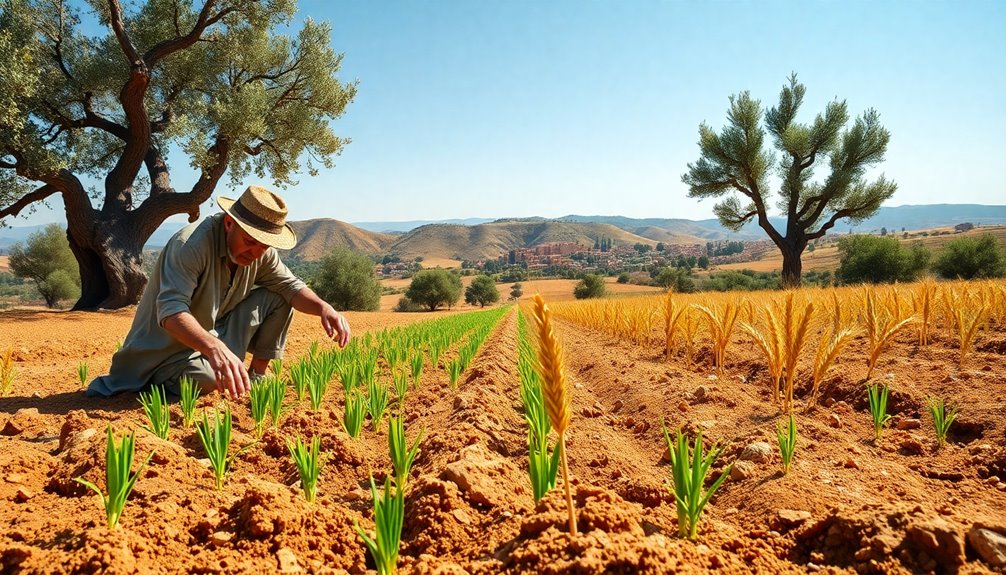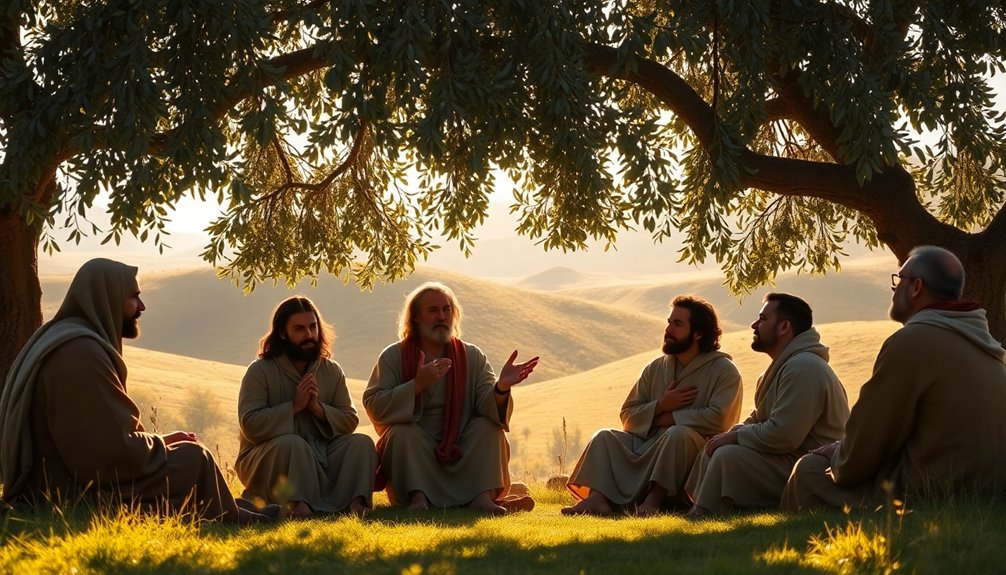The Parable of the Sower, found in Matthew, Mark, and Luke, shows how different heart conditions affect your ability to accept and grow in God's Word. It uses the analogy of a sower scattering seeds on varied types of soil: hard, rocky, thorny, and good. Each type represents how people respond to the Gospel, with good soil symbolizing those who truly understand and nurture their faith. The parable reminds you that the Sower spreads the message generously, regardless of soil quality. If you want to explore how this parable applies to your life today, keep going to uncover more insights.
Key Takeaways
- The Parable of the Sower illustrates how different heart conditions affect the reception and growth of God's Word.
- Four types of soil represent varying responses: hard, rocky, thorny, and good, each influencing spiritual growth differently.
- The Sower, symbolizing Jesus, indiscriminately spreads the Gospel, emphasizing God's grace rather than selective judgment on soil quality.
- Spiritual growth requires a receptive heart and intentional actions, as distractions can hinder faith development and community connections.
- Engaging in community and sharing personal testimonies cultivates faith and nurtures deeper understanding of the Word.
Introduction

When you consider the Parable of the Sower, it's clear that this story holds profound insights about how people respond to spiritual teachings.
Found in Matthew 13, Mark 4, and Luke 8, the parable illustrates the different heart conditions that affect the reception of God's Word. The sower scatters seeds on four types of soil: hard, rocky, thorny, and good, each representing distinct responses to the gospel message.
The hard ground symbolizes those who hear the Word but lack understanding, leading to immediate rejection by the enemy. You might recognize this in individuals who dismiss spiritual teachings outright.
On the rocky ground, you see people who initially accept the message with joy, yet they fall away when trials arise due to shallow roots.
Then there's the thorny ground, where worldly distractions choke spiritual growth, keeping individuals from fully embracing the message.
Finally, the good soil represents those who truly understand the Word and produce a fruitful harvest.
This parable challenges you to reflect on your own heart condition—what type of soil are you? Understanding these different responses can deepen your spiritual journey and help you nurture your faith.
Core Biblical Texts

In exploring the Core Biblical Texts of the Parable of the Sower, you'll find primary references in Matthew, Mark, and Luke that illustrate Jesus' teaching.
These passages highlight how different soil types represent various responses to God's Word.
Understanding these key texts will deepen your insight into the parable's message and its impact on your faith journey.
Primary Bible References
The Gospels' accounts of the Parable of the Sower—Matthew 13:1-23, Mark 4:1-20, and Luke 8:4-15—showcase its essential role in Jesus' teachings. Each Gospel provides a unique perspective, emphasizing the significance of the Sower and the seeds.
In Matthew, Jesus explains that the different soils represent various responses to the Word of God, highlighting the spiritual implications behind each type.
Mark elaborates on this by detailing how the seed symbolizes the Word itself, while the soils represent the conditions of people's hearts. This insight helps you understand the impact of receptiveness and rejection in spiritual growth.
Luke further emphasizes the notion of good soil, illustrating how a heart open to the Gospel leads to fruitful understanding and nurturing of faith.
Secondary Bible References
How do other biblical texts deepen your understanding of the Parable of the Sower? The Synoptic Gospels—Matthew, Mark, and Luke—provide critical insights into how different types of soil represent varying levels of spiritual receptiveness.
In Matthew 13:18-23, you see how the seed fell on good soil yields a fruitful harvest, illustrating the importance of those who truly hear and understand the Word. Mark 4:15 warns you about the seed that falls on the path; these individuals hear the Word but lack understanding, making them vulnerable to Satan's snatching.
The rocky ground, as depicted in Matthew 13:20-21, shows how people may receive the good news with joy initially but fall away during tribulation due to shallow roots. This highlights the necessity of deep spiritual grounding.
Luke 8:14 describes the thorny soil as those distracted by life's cares, riches, and pleasures, resulting in unfruitfulness. Together, these texts emphasize that genuine engagement with the Gospel requires more than just hearing; it demands understanding, commitment, and a focus on spiritual growth to avoid unfruitfulness in your life.
Agricultural Practices of Ancient Palestine

Amidst the rolling hills and fertile valleys of ancient Palestine, agriculture formed the backbone of society, shaping both the economy and daily life. Farmers relied on a variety of crops, including wheat, barley, and olives, vital for survival. One common method, broadcasting, involved scattering seed by hand across prepared fields, a practice that reflects the connection between the sower and the soil. This soil represents not just the land but the community's collective effort in nurturing it.
The region's Mediterranean climate, with its wet winters and dry summers, meant that farmers depended heavily on seasonal rains for successful harvests. To combat soil erosion and maximize arable land, they ingeniously employed terracing on hilly terrain. This practice not only preserved soil but also enhanced productivity, fostering a sustainable agricultural environment.
Additionally, ancient Palestinian farmers often worked together, embodying a sense of community in their planting and harvesting activities. This collaboration not only strengthened bonds but also ensured that everyone shared in the land's bounty.
Through these agricultural practices, they cultivated not just crops but also a rich cultural heritage rooted in shared responsibility.
Symbolism of the Seeds

Seeds hold profound symbolism in the Parable of the Sower, representing the Word of God and its transformative potential. Each seed embodies the message of the Gospel, holding the promise of spiritual fruit when sown in good soil.
However, the outcome varies greatly based on heart conditions, illustrating how different types of soil affect the reception of God's Word.
When seeds fall on good soil, they flourish, yielding a harvest of thirty, sixty, or even a hundredfold. This abundance signifies the incredible fruitfulness that arises from truly accepting the Word.
Conversely, seeds that land on rocky or thorny ground struggle to grow, symbolizing unprepared hearts that hinder the Gospel's impact.
The Parable of the Sower emphasizes that while the sower scatters seeds generously, the growth and eventual harvest depend on the soil's readiness to receive and nurture those seeds.
Your heart condition plays a crucial role in determining how effectively the Word of God can work in your life. By cultivating good soil within yourself, you can open the door to a rich harvest of spiritual fruit.
Misunderstanding the Sower's Role

You might think the Sower's role is all about the quality of the soil, but that misses the point entirely.
This misunderstanding can lead to skepticism about the effectiveness of the seeds, or the Gospel, when it's actually the Sower's generous act that matters most.
Recognizing the Sower's intention helps you appreciate the unconditional love and grace that are available to everyone, regardless of their condition.
Debunk Common Misconceptions
A common misconception about the Sower in the Parable of the Sower is the belief that he selectively chooses where to sow his seeds based on the soil's quality.
In reality, the Sower represents Jesus or any messenger of the Gospel, spreading the Word of God indiscriminately. This act symbolizes the universal offer of grace, emphasizing that everyone has access to the Kingdom, regardless of their heart condition.
Misunderstanding the Sower's role leads many to think he judges the soil before sowing, but that's not true.
The Sower scatters seeds generously, showcasing the abundant nature of God's love and the Gospel.
It's vital to realize that while the effectiveness of the seed may depend on the heart's condition, the Sower's role is simply to share the message without prejudice.
Skepticism About Seed Effectiveness
Skepticism about the effectiveness of the seed often stems from the stark contrast in outcomes seen in the Parable of the Sower. You might question why some seeds thrive while others fail. However, it's crucial to understand that the seed—the Gospel—holds inherent power, regardless of the soil's condition.
The Sower, representing God, scatters seeds indiscriminately, showcasing His grace and willingness to offer salvation to everyone. When only the good soil produces a fruitful harvest, it's easy to misinterpret this as a flaw in the seed. Instead, the parable illustrates the importance of the heart's condition in receiving the message.
Not everyone will respond positively, but that doesn't diminish the potency of the Gospel. Misunderstandings about the Sower's role can lead to the belief that some individuals are unworthy of receiving the seed. It's vital to embrace the inclusivity of God's grace, recognizing that all are invited to partake in this message.
Ultimately, the varying responses highlight how the heart—like soil—determines the outcome of what's sown, not the seed itself.
Seed Planting in Daily Life

In your daily life, every choice you make can either nurture or hinder spiritual growth.
By actively engaging in your community and sharing kindness, you create opportunities for others to experience the Gospel.
These small actions can lead to significant growth, both for yourself and those around you.
Daily Choices Reflect Growth
Planting seeds through daily choices shapes your spiritual growth and relationship with God. Each time you engage in prayer, read scripture, or participate in community activities, you're actively nurturing the good soil of your heart. These daily choices create a receptive environment for the Word to take root, fostering a fruitful faith.
However, it's crucial to be mindful of the distractions and thorns—like materialism and worries—that can choke your spiritual growth. By intentionally avoiding these, you can cultivate an atmosphere that encourages positive change.
Just as the sower who scatters seed does so indiscriminately, your actions can spread the Gospel's message, impacting those around you and contributing to a collective harvest of faith.
Reflecting on your daily choices allows you to evaluate your heart condition. Are your actions aligning with the principles of the Gospel? Taking time to assess this can lead to a more fruitful living that glorifies God.
Community Growth Strategies
Community growth strategies thrive on your active participation and the genuine connections you forge with others. Just like good soil nurtures a seed, your engagement in daily acts of kindness—like helping neighbors or volunteering—plants seeds of faith in your community, fostering spiritual growth.
The seed is the Word, and by hosting small group discussions or Bible study sessions, you create a nurturing environment for deeper understanding and connection among participants.
Sharing personal testimonies can inspire others and showcase the transformative power of the Gospel, acting as a catalyst for curiosity and openness. These stories resonate and encourage those around you to explore their own faith journeys.
Creating community outreach programs that address local needs—such as food drives or mentorship initiatives—allows you to live out your faith actively. These tangible actions reflect the principles of the parable and make a real difference.
Encouraging regular prayer and meditation on Scripture within your community helps cultivate receptive hearts, enhancing everyone's ability to absorb and apply the teachings of the Gospel in daily life.
Final Thoughts on Growth

Growth in your spiritual journey requires intentionality and a willingness to cultivate the right environment. Just like the good soil in the Parable of the Sower, your heart needs to be receptive to foster spiritual growth. This means actively engaging in practices like prayer and meditation on Scripture to nurture your faith environment.
You must also recognize the challenges that can hinder your journey. The rocky ground illustrates how initial joy can fade without deep roots of perseverance. When trials come your way, staying committed to your faith is essential.
Additionally, the thorny ground serves as a reminder to prioritize your spiritual commitments, as distractions from worldly concerns can easily choke your growth.
Finally, remember that spiritual growth isn't a solo endeavor. Collective engagement with fellow believers strengthens your faith journey. By sharing the Gospel and supporting one another, you create a thriving community that encourages persistence and deepens your understanding.
Embrace these truths, and you'll find your spiritual journey flourishing despite the inevitable challenges along the way. Engage deeply, and allow the good soil of your heart to produce lasting fruit.
Additional Resources

Exploring the Parable of the Sower can be greatly enhanced by utilizing a variety of additional resources. Study guides and commentaries provide in-depth analyses, helping you grasp the spiritual implications of Jesus' teachings.
When you dive into these materials, you'll discover how the different types of ground—like those that fell on good soil—relate to the receptiveness of people to the kingdom of God.
Online platforms and church websites often offer sermon series and discussion materials that delve into the themes of faith and good works presented in the parable. Books focusing on parables of Jesus enrich your understanding by offering historical context and theological insights.
Consider watching educational videos or lectures by biblical scholars that visually illustrate the significance of each soil type. This can deepen your comprehension of the overall message.
Additionally, engaging in community groups and Bible study sessions allows for dynamic discussions, encouraging personal reflection on how these teachings apply to your life.
Frequently Asked Questions
What Is the Main Message of the Parable of the Sower?
The main message of the parable of the sower focuses on how different hearts respond to important teachings.
You can think of it as examining your own heart's condition. If it's hard, you might reject valuable insights.
A rocky heart leads to fleeting understanding, while a thorny one gets distracted by life's worries.
Only a good heart truly embraces and nurtures these teachings, producing meaningful change and growth in your life.
What Is the Main Lesson of the Parable of the Sower?
The main lesson of the Parable of the Sower is all about the condition of your heart and how it impacts your response to spiritual teachings.
You've got to reflect on how receptive you're to these messages. If you nurture your heart like good soil, you'll likely experience growth and produce positive results in your life.
It's essential to stay aware of distractions and cultivate a genuine acceptance of deeper truths.
What Do the Four Soils Represent in the Parable of the Sower?
The four soils represent different responses to spiritual teachings.
The hard ground shows you might resist understanding, letting doubt take over.
The stony ground indicates you might feel joy initially but falter when challenges arise, lacking deep faith.
The thorny ground reveals how worries and materialism can choke your spiritual growth.
Finally, the good soil illustrates a receptive heart, where you nurture your faith and experience meaningful, fruitful growth in your life.
How Did Jesus Explain the Meaning of the Parable of the Sower?
Jesus explained the parable of the sower by illustrating how different people respond to His message.
He pointed out that some hear the Word but don't understand it, leaving room for the enemy to snatch it away.
Others initially accept it joyfully but falter under pressure.
Some let life's worries and wealth choke their growth, while those who truly understand and accept it flourish, producing a bountiful harvest in their lives.










